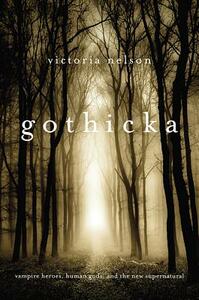Take a photo of a barcode or cover
OPENED MY MIND TO THE WONDERS OF THE GOTHICK!!! made me read dracula and Frankenstein.... Victoria Nelson I am forever in your debt.
I very much wanted to dislike this book for two reasons -- 1. The use of the K -- please. 2. This bit from the preface: "I have made no attempt to survey the present of Gothick scholarship [is there any GothicK scholarship?] and position my own thinking within it, thereby omitting mention of many current key thinking in this vast, rick and exciting field" (xii-xiii).
Um, someone should tell this lady how scholarship usually works. I'm going to go with intellectually arrogant to describe the tone. And, that pretty much remains throughout (although to a much lesser degree).
However, she's got some great observations and is a damn fine close reader. She's clearly familiar with the genre and cultural history and folds them into her arguments quite smoothly (for the most part, there were several spots when the narrative more or less stopped to provide a history lesson). Also, I would really like to see her engage with some of what's out there; Edmundson's *Nightmare on Main Street,* for instance. That discussion could be fascinating.
I really feel like I should reread and think further about her ideas -- particularly where they might mesh with my own (for I, of course, have my own Gothic project). So, in the end I found this well worth the time and intellectual effort.
Um, someone should tell this lady how scholarship usually works. I'm going to go with intellectually arrogant to describe the tone. And, that pretty much remains throughout (although to a much lesser degree).
However, she's got some great observations and is a damn fine close reader. She's clearly familiar with the genre and cultural history and folds them into her arguments quite smoothly (for the most part, there were several spots when the narrative more or less stopped to provide a history lesson). Also, I would really like to see her engage with some of what's out there; Edmundson's *Nightmare on Main Street,* for instance. That discussion could be fascinating.
I really feel like I should reread and think further about her ideas -- particularly where they might mesh with my own (for I, of course, have my own Gothic project). So, in the end I found this well worth the time and intellectual effort.
Cultural criticism is great, because I feel like it validates my pop culture choices. Also, I know want to watch all the foreign horror films.
Gothicka starts off a very insightful survey of early Gothick lit, and contextualizes those important books in their religious, political, and global history. Soon enough, though, it becomes a catalog of lists and descriptions of books, movies, and other spooky media.
I like bold theses in books like this, whether or not I ultimately agree in the end. I hope for the author's insights and conclusions. This felt like "I had a great time at Sitges" until the book ran out of pages and it then was "I don't know what to make of how Gothick has changed, but it has changed while being alive and well." All in all a pleasant conversation, but I hope for more crunch from my lit theory.
I like bold theses in books like this, whether or not I ultimately agree in the end. I hope for the author's insights and conclusions. This felt like "I had a great time at Sitges" until the book ran out of pages and it then was "I don't know what to make of how Gothick has changed, but it has changed while being alive and well." All in all a pleasant conversation, but I hope for more crunch from my lit theory.
challenging
informative
slow-paced
Though I dug into this with massive optimism, I wasn't ready for the dissection and regular return to Dan Brown's work throughout. Enjoyable and interesting reading for authors, horror readers and film fans, Gothika unfolds the 'gothic' lurking under many contemporary fan faves. Even if I liked the idea more than the contents, it will still be lent to a few academics that will also enjoy the ideas that Nelson mulls over.
This book is essential reading for anyone who loves the Gothic and its traditions/roots in literature, and contains very useful analyses of everything from Buffy the Vampire Slayer to Twilight to Anne Rice, Laurell K. Hamilton, Poppy Z. Brite and beyond. There are chapters devoted to zombies, to how the Gothick ethos has bled into cities, a chapter devoted to Guillermo del Toro (which is phenomenal), and more. I absolutely devoured this book, particularly for its analysis of why the dominant themes of Wuthering Heights and Jane Eyre have endured in popularity and continue to play out in current fiction and films.
Nelson has done a great thing. This book includes an erudite history of the Gothic in books and film. It also reviews a great many recent additions (and no other book has inspired me to consume so many books and movies reviewed). Most impressively, Nelson offers a tentative prediction for where the Gothic is heading. It's a bold prediction: that the Gothic will lead to the development of a neo-Gnositc American-based world religion in the 21st century.
Nelson really knows the genre, but what's especially impressive is her understanding and sympathy for the whole wide world of religious impulses. She admits to her biases, but I see them very little here; I'm pretty sure she and I disagree, but "my side" gets a rare fair hearing. She truly has the heart of a great reviewer, which always begins with sympathy and enthusiasm for the artist's intent.
For this topic, getting religion right is essential. Nelson understands that "Gothick" is, at heart, a religious venture. I don't share her optimism for the long-term success of Gnosticism--I think it's radical subjectivity is self-defeating--but she's dead-on to see its rise in Gothic (and general American) culture, and I feel like I've learned a lot from her insight. Her theories even explain the otherwise mystifying popularity of [book:Twilight|41865], with its well-known artistic limitations. It fits in the trend, advanced first by Anne Rice, of reforming and sort-of-redeeming vampires and other Gothic monsters.
Finally, I'd just like to mention one more delightful personal detail: I found this book the old fashioned way, by pulling it off the shelf while browsing a library. It wasn't covered in cobwebs, and the library's resident ghost didn't cackle as I touched it, but somehow, that detail seems very right.
Anyone interested in religion, Gothic literature (or really any genre), and modern trends in genre evolution and repurposing, really needs to read this book.
Nelson really knows the genre, but what's especially impressive is her understanding and sympathy for the whole wide world of religious impulses. She admits to her biases, but I see them very little here; I'm pretty sure she and I disagree, but "my side" gets a rare fair hearing. She truly has the heart of a great reviewer, which always begins with sympathy and enthusiasm for the artist's intent.
For this topic, getting religion right is essential. Nelson understands that "Gothick" is, at heart, a religious venture. I don't share her optimism for the long-term success of Gnosticism--I think it's radical subjectivity is self-defeating--but she's dead-on to see its rise in Gothic (and general American) culture, and I feel like I've learned a lot from her insight. Her theories even explain the otherwise mystifying popularity of [book:Twilight|41865], with its well-known artistic limitations. It fits in the trend, advanced first by Anne Rice, of reforming and sort-of-redeeming vampires and other Gothic monsters.
Finally, I'd just like to mention one more delightful personal detail: I found this book the old fashioned way, by pulling it off the shelf while browsing a library. It wasn't covered in cobwebs, and the library's resident ghost didn't cackle as I touched it, but somehow, that detail seems very right.
Anyone interested in religion, Gothic literature (or really any genre), and modern trends in genre evolution and repurposing, really needs to read this book.




